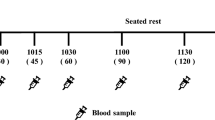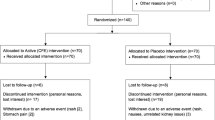Abstract
Objective: Since grape-seed extract has been shown to stimulate lipolysis in vitro and reduce food intake in rats, we assessed the efficacy of grape-seed extract with respect to energy intake (EI) and satiety.
Design: In a randomized, placebo-controlled, double-blind, cross-over study, 51 subjects (age 18–65 y, body mass index 22–30 kg/m2) ate an ad libitum lunch and dinner twice in the University Restaurant for 3 days. Standard breakfasts and snacks were provided. Supplements were taken 30–60 min prior to each meal.
Results: In the total study population, no difference in 24 h EI was found between the grape-seed extract and placebo. However, in the subgroup of subjects (n=23) with an energy requirement ≥the median of 7.5 MJ/day, EI was reduced by 4% (ΔEI 352.1 kJ/24 h, P=0.05) after grape-seed extract compared to placebo treatment. Meanwhile, there were no significant differences in macronutrient composition, attitude towards eating, satiety, mood or tolerance.
Conclusions: Grape seed reduced 24 h EI, with on average 4% in subjects who had an energy requirement ≥7.5 MJ/day, without further effects on satiety, mood or tolerance. These findings suggest that grape seed could be effective in reducing 24 h EI in normal to overweight dietary unrestrained subjects, and could, therefore, play a significant role in body-weight management.
This is a preview of subscription content, access via your institution
Access options
Subscribe to this journal
Receive 12 print issues and online access
$259.00 per year
only $21.58 per issue
Buy this article
- Purchase on Springer Link
- Instant access to full article PDF
Prices may be subject to local taxes which are calculated during checkout

Similar content being viewed by others
References
Ardevol A, Blade C, Salvado MJ & Arola L (2000): Changes in lipolysis and hormone-sensitive lipase expression caused by procyanidins in 3T3-L1 adipocytes. Int. J. Obes. Relat. Metab. Disord. 24, 319–324.
Bond MJ, McDowell AJ & Wilkinson JY (2001): The measurement of dietary restraint, disinhibition and hunger: an examination of the factor structure of the three factor eating questionnaire (TFEQ). Int. J. Obes. 25, 900–906.
Burton BT & Foster WR (1985): Health implications of obesity: an NIH Consensus Development Conference. J. Am. Diet. Assoc. 85, 1117–1121.
Fisher RM, Hoffstedt J, Hotamisligil GS, Thorne A & Ryden M (2002): Effects of obesity and weight loss on the expression of proteins involved in fatty acid metabolism in human adipose tissue. Int. J. Obes. Relat. Metab. Disord. 26, 1379–1385.
Forbes GB, Brown MR, Welle SL & Lipinski BA (1986): Deliberate overfeeding in women and men: energy cost and composition of the weight gain. Br. J. Nutr. 56, 1–9.
Goris AH, Meijer EP & Westerterp KR (2001): Repeated measurement of habitual food intake increases under-reporting and induces selective under-reporting. Br. J. Nutr. 85, 629–634.
Goris AH, Westerterp-Plantenga MS & Westerterp KR (2000): Undereating and underrecording of habitual food intake in obese men: selective underreporting of fat intake. Am. J. Clin. Nutr. 71, 130–134.
Harris JA & Benedict FG (1919): A Biometric Study Of Basal Metabolism in Man. Washington: Carnegie Institution.
Herman CP & Polivy J (1980): Restrained Eating. Philadelphia: Saunders, W.B..
Herman CP, Polivy J, Ardevol A, Blade C, Salvado MJ & Arola L (1975): Anxiety, restraint, and eating behavior. J. Abnorm. Psychol. 84, 66–72.
Johnson RK, Goran MI, Poehlman ET & Seidell JC (1994): Correlates of over- and underreporting of energy intake in healthy older men and women. Am. J. Clin. Nutr. 59, 1286–1290.
Kamphuis MMJM, Mela DJ & Westerterp-Plantenga MS (2003): Diacylglycerides affect substrate oxidation and appetite in humans. Am. J. Clin. Nutr. 77, 1133–1139.
Kovacs EM, Westerterp-Plantenga MS, de Vries M, Brouns F & Saris WH (2001a): Effects of 2-week ingestion of (−)-hydroxycitrate and (−)-hydroxycitrate combined with medium-chain triglycerides on satiety and food intake. Physiol. Behav. 74, 543–549.
Kovacs EM, Westerterp-Plantenga MS & Saris WH (2001b): The effects of 2-week ingestion of (−−)-hydroxycitrate and (−−)-hydroxycitrate combined with medium-chain triglycerides on satiety, fat oxidation, energy expenditure and body weight. Int. J. Obes. Relat. Metab. Disord. 25, 1087–1094.
Kuczmarski RJ, Flegal KM, Campbell SM & Johnson CL (1994): Increasing prevalence of overweight among US adults. The National Health and Nutrition Examination Surveys, 1960 to 1991. JAMA 272, 205–211.
Langhans W & Scharrer E (1987): Evidence for a vagally mediated satiety signal derived from hepatic fatty acid oxidation. J. Auton. Nerv. Syst. 18, 13–18.
McCarty MF & Scharrer E (1994): Promotion of hepatic lipid oxidation and gluconeogenesis as a strategy for appetite control. Med. Hypotheses 42, 215–225.
Miller DL, Bell EA, Pelkman CL, Peters JC & Rolls BJ (2000): Effects of dietary fat, nutrition labels, and repeated consumption on sensory-specific satiety. Physiol. Behav. 71, 153–158.
Pasman WJ, Rossner S, Westerterp-Plantenga MS & Saris WH (1999): Body Weight Changes after Treatment of Obesity or Pregnancy. Edra, Milan, Italy.
Pasman WJ, Saris WH & Westerterp-Plantenga MS (1999): Predictors of weight maintenance. Obes. Res. 7, 43–50.
Pi-Sunyer FX, Becker DM, Bouchard C & al. e (1998): NHLBI Obesity education initiative expert panel on the identification, evaluation, and treatment of overweight and obesity in adults. Obes. Res. 6, 51S–209S.
Raben A, Vasilaras TH, Moller AC & Astrup A (2002): Sucrose compared with artificial sweeteners: different effects on ad libitum food intake and body weight after 10 wk of supplementation in overweight subjects. Am. J. Clin. Nutr. 76, 721–729.
Roberts SB, Pi-Sunyer FX, Dreher M, Hahn R, Hill JO, Kleinman RE, Peters JC, Ravussin E, Rolls BJ, Yetley E, Booth SL & Seidell JC (1998): Physiology of fat replacement and fat reduction: effects of dietary fat and fat substitutes on energy regulation. Nutr. Rev. 56, S29–S41 (discussion S41–29).
Scharrer E (1999): Control of food intake by fatty acid oxidation and ketogenesis. Nutrition 15, 704–714.
Schoeller DA & Seidell JC (1990): How accurate is self-reported dietary energy intake? Nutr. Rev. 48, 373–379.
Seidell JC (1998): Dietary fat and obesity: an epidemiologic perspective. Am. J. Clin. Nutr. 67, 546S–550S.
Stunkard AJ & Messick S (1985): The three-factor eating questionnaire to measure dietary restraint, disinhibition and hunger. J. Psychosom. Res. 29, 71–83.
Surina DM, Langhans W, Pauli R, Wenk C & Scharrer E (1993): Meal composition affects postprandial fatty acid oxidation. Am J Physiol 264, R1065–R1070.
Tebib K, Besancon P & Rouanet J-M (1996): Effects of dietary grape seed tannins on rat cecal fermentation and colinic bacterial enzymes. Nutr. Res. 16, 105–110.
Westerterp KR, Donkers JH, Fredrix EW & Boekhoudt P (1995): Energy intake, physical activity and body weight: a simulation model. Br. J. Nutr. 73, 337–347.
Westerterp-Plantenga MS, Fredrix EWHM & Steffens AB (1994): Food Intake And Energy Expenditure. Boca Raton, FL: CRC Press.
Westerterp-Plantenga MS, Kempen KP & Saris WH (1998): Determinants of weight maintenance in women after diet-induced weight reduction. Int. J. Obes. Relat. Metab. Disord. 22, 1–6.
Westerterp-Plantenga MS, Kovacs EM, Rolland V, Wilson SA & Westerterp KR (2002): The effect of (-)-hydroxycitrate on energy intake and satiety in overweight humans. Int. J. Obes. Relat. Metab. Disord. 26, 870–872.
Westerterp-Plantenga MS, Pasman WJ, Yedema MJ & Wijckmans-Duijsens NE (1996): Energy intake adaptation of food intake to extreme energy densities of food by obese and non-obese women. Eur. J. Clin. Nutr. 50, 401–407.
Westerterp-Plantenga MS, Rolland V, Wilson SA & Westerterp KR (1999): Satiety related to 24 h diet-induced thermogenesis during high protein/carbohydrate vs high fat diets measured in a respiration chamber. Eur. J. Clin. Nutr. 53, 495–502.
Wielinga PY, Louter-vd Haar J, Poelman MG, Romeijn M, Nieuwenhuizen AG & Scheurink AJW (2002): The effect of (-)-hydroxycitric acid (HCA) and grape seed on food intake, body weight and metabolism. Appetite 39, 106 (abstract).
Author information
Authors and Affiliations
Corresponding author
Rights and permissions
About this article
Cite this article
Vogels, N., Nijs, I. & Westerterp-Plantenga, M. The effect of grape-seed extract on 24 h energy intake in humans. Eur J Clin Nutr 58, 667–673 (2004). https://doi.org/10.1038/sj.ejcn.1601863
Received:
Revised:
Accepted:
Published:
Issue Date:
DOI: https://doi.org/10.1038/sj.ejcn.1601863
Keywords
This article is cited by
-
Low-dose grape pomace and omija fruit extract is more effective than high-dose in lowering oxidative stress and fat-pad mass in db/db mice
Food Science and Biotechnology (2017)
-
Moderate effects of apple juice consumption on obesity-related markers in obese men: impact of diet–gene interaction on body fat content
European Journal of Nutrition (2012)
-
Metabolic constituents of grapevine and grape-derived products
Phytochemistry Reviews (2010)
-
Red mold rice prevents the development of obesity, dyslipidemia and hyperinsulinemia induced by high-fat diet
International Journal of Obesity (2008)



